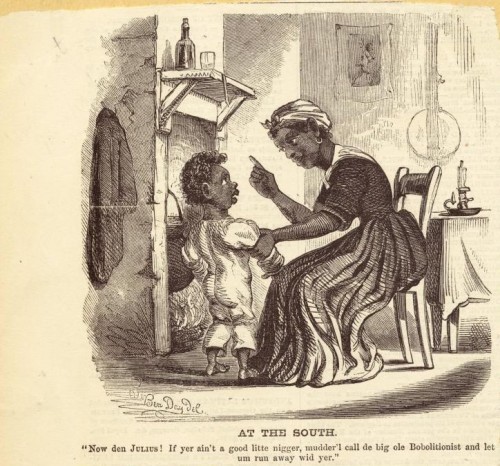| Online: | |
| Visits: | |
| Stories: |

| Story Views | |
| Now: | |
| Last Hour: | |
| Last 24 Hours: | |
| Total: | |
Abolitionist Threat to the South

The African slavery imposed upon the American colonies by a British colonial system eventually became the proverbial “holding the wolf by the ears”; the North ended slavery within its borders but not its transatlantic slave trade. With a large alien population living amongst them, Southerners lived with a submerged fear of the worst: an American version of a Santo Domingo-style massacre. Once the depth of Northern involvement in encouraging and financing John Brown became apparent, the South had little use for its Northern brethren. Violence and blood was the North’s method rather than peaceful solutions.
Bernhard Thuersam, Circa1865
Abolitionist Threat to the South:
“On the wall of my study hangs one of the John Steuart Curry etchings of old John Brown of Ossawattomie, sword and revolver belted at his waist, a suppliant Negro face close to the grim holster, and behind him a Kansas cyclone knifing down from the darkling sky. The imagery is noble, heroic. But my Grandfather Carter would not admire it, were he alive, for he was one of the nervous young militia-men from near-by Charles Town, who circled the Harpers Ferry arsenal and waited for Robert E. Lee and the marines to come and drag out John Brown’s body.
To my grandfather, John Brown was an insane murderer and the father of murdering sons, who sought to loose an old horror upon the Virginia countryside; the horror of the slave revolt, the burning dwelling, the ravished wife, and the slain householder. John Brown was no hero, no martyr to my grandfather who sniped at the arsenal windows. Inside as prisoner was Colonel Washington, the first president’s great nephew and the kindliest gentleman of northern Virginia.
Dead in Harpers Ferry were three other citizens, kindly, decent men too, and one of them a free mulatto. This was no test of the rightness of slavery, this was murder and rapine; and behind old John Brown’s handful of white and Negro followers blew a dank wind from the North, the breath of the Abolitionists, Higginson, Sanborn, Smith, Parker Douglas, and the evil rest, whispering rebellion in the night. These men of New England had encouraged and given money for muskets and sabers to John Brown of bloody Kansas, and now the red, fallen leaves of the Virginia October were redder still. So believed my grandfather, no defender of slavery but of his hearth and State; nor did his opinion change throughout life.
Southern anger and mistrust did not begin or end with Harpers Ferry. A thousand slaves might be docile, but there would always be one to listen to the uncertified stranger; and the Southern white man, counting up the more than two hundred slave uprisings through which the Negro protested his chains, remembered that half of them had been incited by a white conspirator, the fanatic from beyond.
For slavery there is no defense, and long ago there were ardent spokesmen for freedom even within the slave South. But rebellion was not academic; rebellion was Denmark Vessey aloose on the flaming countryside, and Gabriel enrolling his thousands in the woods beyond Richmond, and Charles Deslondes, the free mulatto of San Domingo, killing and burning on the road to New Orleans.
Rebellion lurked behind the whisper of a stranger, the tract of the abolitionist, the speech in Washington; Southern mistrust of the intervener was born and nurtured in an armed camp. If they would just leave us alone, said the moderate men and the worried men of the South together; if they would just leave us alone we would work out our own salvation. But not with a pistol at our heads and a torch at the door.
But the South was not let alone and war is not an abstraction of justice when it is fought among the ruins of a man’s home. My grandfather’s mistrust of the Yankees, vindicated at Harpers Ferry, was not lessened by the bullet that maimed him at Harpers Ferry. Nor was it lessened for anyone in the South, anywhere.”
(Southern Legacy, Hodding Carter, LSU Press, 1950, pp. 120-122)
Source: http://freenorthcarolina.blogspot.com/2014/11/abolitionist-threat-to-south.html



